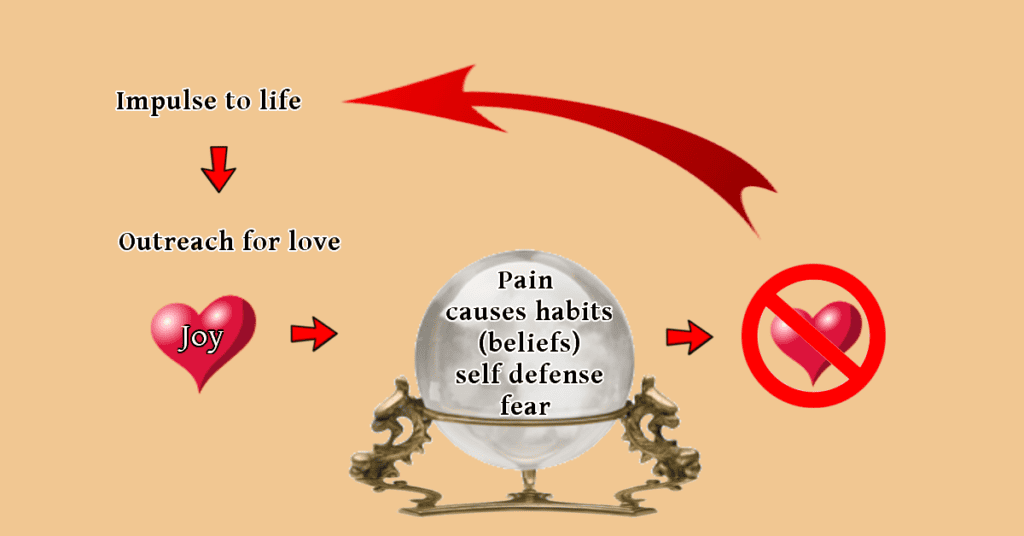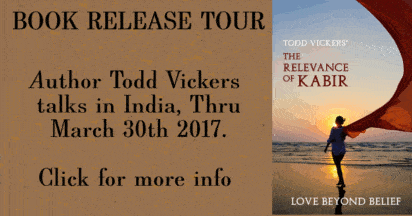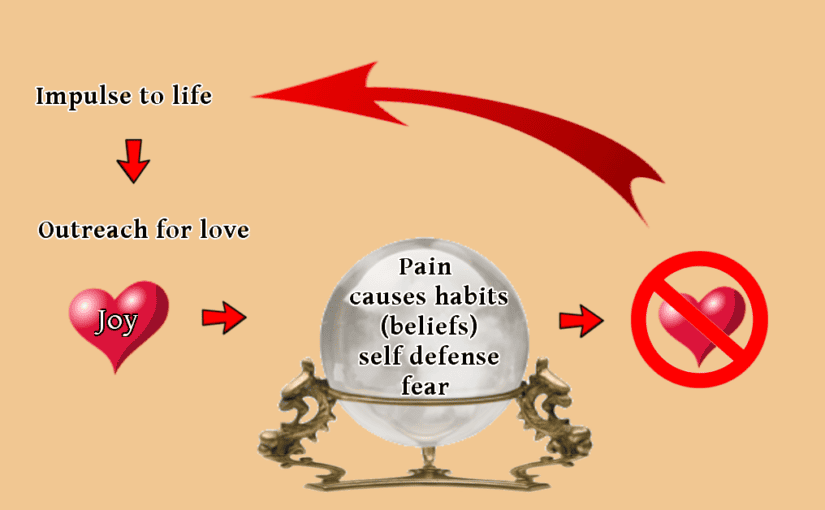
Understanding pain is vital if we wish to bring relief to useless suffering. To reduce useless pain is nurturing to love. But what does that actually mean?
We should understand two sources of suffering.
One source is fact based, some event like a toothache, the loss of someone loved, an abuse etc. The other suffering our mind generates, we make stuff up and believe it, like the real fear created when imagining you’ve lost your wallet when you’ve put it in another pocket and forgot. Both kinds of pain affect our relationships. If we don’t make this distinction between facts and thinking, we suffer. We’re relating to our mind, not a person, but the feelings are still real, like the fear we feel falling in a dream. Sometimes others instill fear into us by creating a concept in our mind, like the idea of hell. Any emotion can be induced through fiction, including joy.
Most of us never get past the story about our or another’s pain to understanding. The story about the pain might show whether the pain is based on fiction or fact and in this way we begin understanding pain. When the pain is based on fictions we do not help people by believing the fictions.
If we mistake knowing the story for understanding pain, then we make matters worse.
When someone recounts some painful story, assuming it really happened, we’re moved and understand the event as a source of pain, but even still, it is a source of pain in the past! That painful event is long gone, perhaps the people involved are dead. The pain now is an ongoing habit of mind. A habit of mind is quite different from the original event, it takes place today from the mind as a source. Moreover, a smoker may comprehend ‘why’ he or she smokes, that doesn’t stop them from smoking. What will stop them from smoking is consciously breaking the habit and it is the same with habits of mind. One cannot make a habit of breaking habits because, once we relegate something to autopilot, we must consciously take the control away from the subconscious mind and that takes consciousness. We consciously disobey fear when we know it serves no purpose e.g. how many students expecting to flunk, passed a test.
There is a common idea that ‘if my childhood were different, I would be happy.’ Indeed many habits seem to develop in childhood but this river of thought moves into a desert. We’re not understanding pain, we’re comparing our lives to a fiction that didn’t happen and that is not adapting to the world. We can’t change the past but we can get free of habits. Kindly consider how the words habit, belief, expectation, generalizing, bias, prejudice, routine, anticipation all overlap in one regard. They all involve a prediction. The subject of the prediction in this case is the ego or concept of self, what we call ‘I.’ To make this ‘I’ creature more clear I will use an ancient story.
A man is walking on a path in twilight and steps on something, he looks down and sees he is standing on a snake and, in his fear, he dies of a heart attack. The next day people find his body next to a piece of rope.
There are two illusions in the story above, one is easy to see the other requires more subtle understanding. We see how the snake existed as a fiction in the man’s mind and that idea projected from the mind onto the rope. But the man as he imagined himself, in the narrative, the one he imagined at risk of being bitten, that self never existed, that was mental fiction. Both the snake and the imagined victim were unreal. But since the man identified himself with his concept, he suffered.
Anyone who can conceive might make the mistake of the poor man above. The concept of ‘I’ is a double-edged sword. With it we extend trial and error into a virtual realm of mind where we can imagine and create safely and that’s good. But when we mistake the concepts and conclusions as material facts not thoughts, we become lost in our own mind. I’ll discuss a solution to this shortly.
 We can’t really understand the pain until we understand this idea of self is a fiction. When we get identified with that self concept in our mind and forget it is a fiction, we are at the mercy of our own imagination. When we are falling in a dream and wake, what happens? We realise the self conceived in a dream is not real and we feel relief. That same realization should happen in our waking hours because our waking idea of self is just as mental.
We can’t really understand the pain until we understand this idea of self is a fiction. When we get identified with that self concept in our mind and forget it is a fiction, we are at the mercy of our own imagination. When we are falling in a dream and wake, what happens? We realise the self conceived in a dream is not real and we feel relief. That same realization should happen in our waking hours because our waking idea of self is just as mental.
The concept of self is the purchaser of heaven, hell, and reincarnation because we expect a self in such a future and future is by definition imaginary. In our attempt to secure and support this self concept, every attempt will eventually fail because no thought is sustainable. This imagined ego is an endless source of useless misery. If we are not on to this fiction of self than it becomes a governing force behind the scenes. The habit of mistaking this imagined self as who we are is perhaps one of our oldest and most troublesome habits.
When talking about understanding another’s pain, we must understand if that pain is a result of real events or based on ideas including a fictional self concept. If we look no deeper than the story then we assume the snake is real like the imaginary man who dies of a heart attack. We perpetuate the misery because now another person believes something fictional is factual. Fictions have consequences in the real world. Think of prejudices or preëmptive war.
In miss-understanding pain we hurt others without knowing we are doing so.
We do not love another’s ideas of themselves. We love the people who can let go of these fictions. Unfortunately people build relationships out of supporting each other’s fictions, understanding pain becomes impossible and people even call this love and support! It’s more like a recipe for miserable failure.
Meditation is diving into the awareness that exists in the midst of any thought or experience. To recognize this awareness allows us not only to doubt any thought but also, to not identify ourselves with the ideas about self coming and going within us. Now we can use the mind instead of being used by it. Now instead of adapting ourselves to our fictions about ourselves and others, we test our ideas against facts, rid ourselves of falsehoods and explore our love with real people by adapting to the love beyond the limits of our habits of mind and any fictional self. Then our love is finally free.
By Todd Vickers

3 replies on “Understanding Pain Nurturing Love”
[…] One source is fact based, some event like a toothache, the loss of someone loved, an abuse etc. The other suffering our mind generates, we make stuff up and believe it, like the real fear created when imagining you’ve lost your wallet when you’ve put it in another pocket and forgot. Both kinds of pain affect our relationships. If we don’t… Read more at Vivriti.org […]
[…] We do not love another’s ideas of themselves. We love the people who can let go of these fictions. Unfortunately people build relationships out of supporting each other’s fictions, understanding pain becomes impossible and people even call this love and support! It’s more like a recipe for miserable failure. Meditation is… Read More at Vivriti.org […]
[…] be beautiful and worthwhile. The same could be said of any kind of affection, including sexuality. Affection without deceit or destructiveness is an important part of a good […]